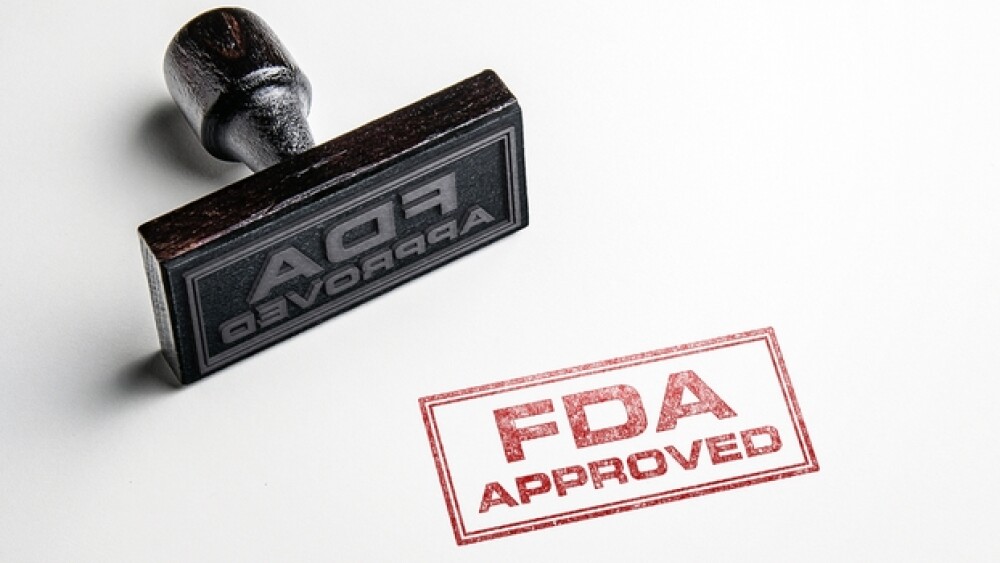The new authorization is expected to be the final reassurance for many of those who had hesitated when the vaccine was approved under emergency use only.
On Monday, just a year-and-a-half after COVID-19 sent the planet into a tailspin, the U.S. Food and Drug Administration (FDA) gave full approval to the Pfizer-BioNTech COVID-19 vaccine for individuals 16 and older. Emergency use remains in place for adolescents 12-to-15, and also applies to booster shots.
The implications for Pfizer and BioNTech stocks were immediate, with the pharma giant climbing 2.5% on Monday, while its German partner jumped by 9.6%.
Approval for the vaccine, which will now be marketed as Comirnaty, was informed by updated safety and effectiveness data from a clinical trial of more than 40,000 recipients ages 16 and older. Before emergency use, safety was initially analyzed in a total of 22,000 people from both the vaccine and placebo cohorts. Prior to yesterday’s approval, more than half of the trial participants were followed for safety outcomes for at least four months following their second dose. In total, approximately 12,000 recipients have now been followed for at least six months, the standard timeline for full approval.
The new authorization is expected to be the final reassurance for many of those who had hesitated when the vaccine was approved under emergency use only. According to a Kaiser Family Foundation poll conducted in June, 31% of unvaccinated individuals claimed they would be more likely to receive the vaccine under full FDA approval.
The official sign-off also gives physicians more liberty to prescribe Comirnaty based on their own clinical judgement. While operating under emergency status, doctors were required to maintain strict adherence to the regulators’ dosing guidance.
This means that while the vaccine is only officially authorized for those 16 and above, and under EUA for 12-to-15 year olds, doctors now have the authority to administer it off-label – or for a use not listed on the product’s official label – to younger children. This could have implications as the school year begins, though both the FDA and American American Academy of Pediatrics (AAP) have strongly discouraged the practice.
“The clinical trials for the COVID-19 vaccine in children ages 11-years-old and younger are underway, and we need to see the data from those studies before we give this vaccine to younger children. The dose may be different for younger ages. The AAP recommends against giving the vaccine to children under 12 until authorized by the FDA,” said AAP President Dr. Lee Savio Beers.
FDA Acting Commissioner Dr. Janet Woodcock said on Monday that the use of Comirnaty in children under 12 “would not be appropriate.”
“We do not have data on the proper dose nor do we have full data on the safety in children younger than what is in the EUA,” Woodcock said. “So that would be a great concern that people would vaccinate children because we don’t have the proper dose and we don’t have the safety data, nor do we have all the efficacy data, as well. We are not recommending that children younger than age 12 be vaccinated with this vaccine.”
Physicians will also be at liberty to administer third booster shots to patients prior to eight months after their second vaccine, as stipulated in the FDA’s August 18 guidance.
The approval’s aftermath is expected to spawn a wave of mandates from businesses, government and academic institutions.
The legal course for government leaders and corporate leaders is also now clearer. On Monday, New Jersey Gov. Phil Murphy announced that vaccination would be required for teachers and state employees, unless exempt.
The Pentagon plans to make the vaccine mandatory for all active-duty members by the middle of September. In July, Secretary of Defense Lloyd Austin said that he would seek President Biden’s approval to enact this requirement “immediately” upon official licensure of a vaccine.
Academic institutions such as Rowan University are now able to strengthen their policies. Rowan, which had previously allowed students to request exemptions for personal reasons, will now allow them to apply only for medical or religious exemptions.
A Contingency Plan for Delta
Meanwhile, Pfizer Chief Executive Officer Albert Bourla told NBC News on Monday that his company is developing a specialized vaccine targeted at the highly contagious Delta vaccine running rampant across the country.
“We are making a specialized vaccine for Delta. I am almost certain that we will not need it because the booster shot of the current vaccine is very, very, very effective against Delta, but we cannot take that chance,” Bourla stated.
He added that he expects data on studies in children 5 to 11-years-of-age to be completed in September.






